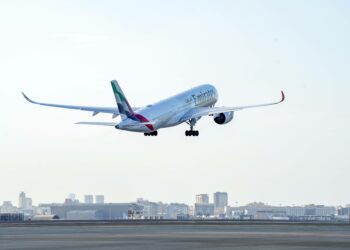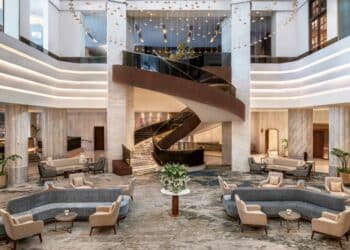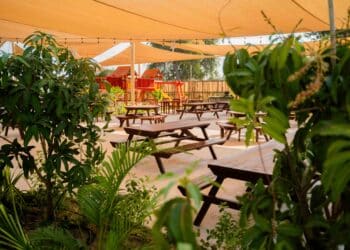
Qasr Al Sarab Desert Resort and Anantara Sir Bani Yas Island Resorts have unveiled notable sustainability and animal welfare achievements for the period of 2023 -2024, to date.
As bucket-list destinations, both resorts have successfully introduced initiatives that blend sustainability with their luxury identity, proving that environmental responsibility can enhance the guest experience. These efforts further solidify their standing as leaders in both sustainable hospitality and luxury travel in the UAE.
Rooted in the Anantara brand’s core values, both resorts are committed to preserving natural ecosystems while celebrating local Emirati heritage. Led by Mark David Penfield, Cluster Conservation Manager, the team remains dedicated to advancing conservation and sustainability initiatives within the hospitality field.
Qasr Al Sarab Desert Resort by Anantara
Just a 2.5-hour drive from Dubai, nestled among the flame-coloured dunes of Abu Dhabi’s vast Empty Quarter, Qasr Al Sarab Desert Resort by Anantara is on a mission to become the greenest desert resort in the world.
The resort has adopted a comprehensive approach to animal protection, desert greening, and enriching the guest experience through deeper exploration of the surrounding natural landscapes.
Sustainable Practices in Action
In its efforts in becoming the greenest desert resort in the world, Qasr Al Sarab Desert Resort is collaborating with BE WTR for onsite consumable water production. This state-of-the-art innovative approach, which produces high-quality and purified water directly on site, eliminates the need for single-use plastic bottles, and therefore reducing the carbon footprint associated with transport emissions.
The resort aims to produce 1000 bottles of water per day through a semi-automated system, and will be packaged in reusable glass bottles, which are then used across the hotel’s 207 rooms, suites, villas and more. It also utilises a Sewage Treatment Plant (STP) which recycles around 250m3 of water daily to irrigate the plants and vegetation on site.
The resort is also reducing plastic usage by utilising terracotta pots for planting and managing plant waste through a woodchipper to create potting mulch. In January 2024, 800 kg of palm waste was recycled, preventing it from ending up in landfills.
In addition to plastic bottles, the resort is also working to eliminate all plastic-based disposable packaging across various divisions. In collaboration with Avani Middle East, an eco-friendly packaging brand, the resort is designing a range of unique packaging solutions, including cups, straws, takeaway containers, and cutlery sets, to promote sustainability throughout the resort and UAE.
Ezba
The opening of Ezba, an educational and interactive space at the resort, pays homage to Emirati heritage while enabling the growth of over 150 kg of crops and vegetation each winter from October to May. This space is home to a diverse selection of herbs, cucumbers, bell peppers, and tomatoes, all of which are utilised and distributed across the resort’s restaurants. In 2023, Ezba produced more than 3,000 kg of organic produce, resulting in cost savings of AED 12,000 for the property.
Ezba also represents a significant step in highlighting the historical struggles of the Bedouin people to survive in one of the world’s harshest environments. This initiative aligns with the visionary commitment of His Highness Sheikh Zayed bin Sultan Al Nahyan towards nature and conservation, a cause that resonates deeply with the resort’s dedication to safeguarding ecosystems.
In 2023, approximately 3,500 kg of dates were harvested, with 23% classified as Grade A, suitable for consumption. The remaining dates were categorised as Grade B, suitable for making date syrups and cakes, and Grade C, suitable for animal consumption or composting. Only Grade A dates were considered in the cost analysis, leading to additional savings of AED 28,140 for the property. In 2024 the date harvest was more successful with 2109kg of dates suitable for consumption and 1500kg for animal feed or compost. The resort’s Executive Chef Pino help set up a collaboration with Liwa Dates for the packaging and sorting of the dates and are aiming to have Ezba’s very own dates from October for guests.
Moreover, Ezba is powered by solar panels, providing 65 kW of energy to support its operations across the space’s main building, the green house and hydroponics. In terms of water planting systems, Ezba uses ground water for most of the trees and vegetation, which saves the hotel around 1100 – 1500 AED per day and an average 40,000 – 50,000 AED per year.
Last year, the Department of Culture and Tourism (DCT) and the Garcia Group showcased the conservation and sustainability efforts at Ezba and Qasr Al Sarab Desert Resort by Anantara during a Guinness World Record attempt for hosting the World’s Largest Agriculture Lesson. The property was used as a case study, and DCT was awarded the record for this achievement.
Animal Protection and Welfare
Qasr Al Sarab Desert Resort by Anantara is actively engaged in animal protection and the safeguarding of endangered species in collaboration with the Environmental Agency. Currently, the resort is assisting with the monitoring of reem (sand) gazelles by facilitating the settlement of females and the later introduction of males for a collaborative effort to breed and release animals to the Empty Quarter. The gazelles were on the brink of extinction just 50 years ago.
At the end of 2024, the resort will introduce the national animal of the UAE, the Arabian Oryx, to Ezba for safeguarding in 2025, adding another captivating dimension to the guest experience. Guests can learn how the Arabian Oryx was successfully brought back from ‘extinct in the wild’ status through a highly effective captive safeguarding and release programme, highlighting its cultural significance.
Overseeing this vital initiative, Mark David Penfield plays a pivotal role in ensuring a comprehensive approach to animal protection, safety, and behaviour. His responsibilities extend to educating resort teams on conservation and sustainability practices and serving as a liaison with organisations responsible for the management of land and ecosystems.
Anantara Sir Bani Yas Island Resorts
Situated on the 87 sq km island of Sir Bani Yas, the largest natural island in the UAE, Anantara Sir Bani Yas Island Resorts encompasses Al Yamm Villa Resort, Al Sahel Villa Resort, and Desert Island Resort & Spa by Anantara. The resorts are at the forefront of animal conservation and promoting a greener future in the UAE.
Renewable Energy
Anantara Desert Island Resort and Spa has started a bottling plant project, a small green house initiative in the hope to reduce carbon emissions and plastic pollution to follow its targets set by Minor and the UN SDG’s. Waste management has become a point of discussion with adding wet waste rooms and starting more extensive segregation procedures.
Sir Bani Yas was the first island in the region to install wind turbines as part of a government initiative to go green, the wind turbines provide the island’s three resorts with full electricity while supplying additional energy to the mainland city of Al Dahnna. This initiative aligns with the nation’s goal of achieving net-zero emissions by 2050.
The island is entirely green, equipped with 10 wind turbines, each with a maximum capacity of 4 MW, alongside a solar field generating 17 MW. The total maximum output directed to the grid is 57 MW, which eliminates the need for batteries and, consequently, waste.
Sir Bani Yas has fruit plantations and a nature reserve for native endangered species and gifts from countries worldwide adding foreign desert species that people can safely observe on a guided tour.
Animal Protection and Welfare
As the home to Arabia’s largest wildlife reserve, Anantara Sir Bani Yas Island Resorts has seen Mark collaborate with private and government conservation efforts such as Barari Natural Resources and with the Environmental Agency Abu Dhabi. This conservation programme focuses on ensuring the survival of the island’s endangered species through breeding and relocation initiatives. Mark helps provide education and training to new resort guides to ensure the knowledge is passed on and the legacy of Sheikh Zayed, his vision for greening the desert and safe breeding of endangered species for future generations is told.
The vast island now hosts over 11,000 animals from 30 different species, including Arabian Oryxes, gazelles, and flamingos, honouring the conservation legacy of the late ruler and founder of the United Arab Emirates, His Highness Sheikh Zayed Bin Sultan Al Nahyan.
The island’s legacy is showcased and advertised daily by the Anantara team, the guides play a pivotal role in explaining its past trading significance, deep cultural connection and interesting history, while looking after animals and highlighting conservation and sustainability.
Looking ahead to 2025
In its continuous efforts to preserve the UAE’s natural ecosystems and improve environmental practices, Anantara Qasr Al Sarab Desert Resort is looking to add solar power across the resort including the wider teams’ accommodation units and Ezba.
The resort has already made significant improvements in plastic and waste reduction and aims to be plastic free by the end of 2025 and will also be looking at implementing efficient and environmental friendly tools to manage large bales of animal feed and waste, which will be a game changer to farming and land management at Ezba in the long run.
The Engineering team at Sir Bani Yas Island is looking to add Aeroponic Towers to help increase leafy greens and vegetation in a farm to folk approach technique, as well as establish a better Water Sports engagement with conservation and sustainability practices.



































































